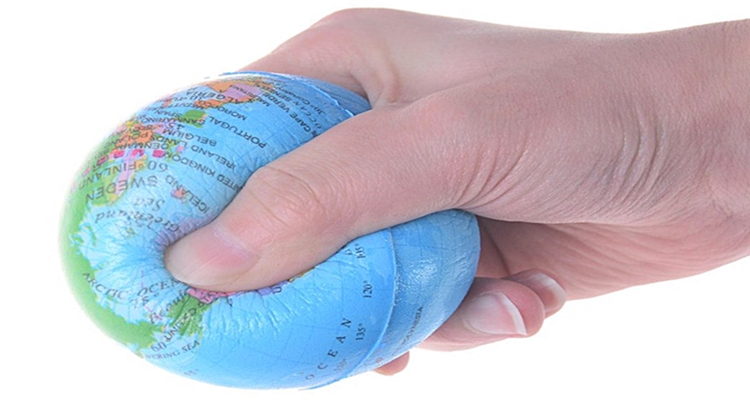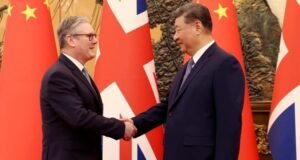
“I tend to see China’s rise as a huge win for the world,” says Bill Gates.
“We believe that China has a crucial role to play in achieving our shared goal of building a fairer and healthier world,” says the website of the Gates Foundation.
Gatesway to the CCP
To help Red China build a fairer world, the Gates Foundation invested “tens of millions of dollars’ worth of stock in corporations the Department of Defense designated as ‘Chinese military companies,’ ” The Washington Examiner reported on May 7, 2025. T
The newspaper said that “the Gates Foundation Trust, the nonprofit organization responsible for managing the endowment of the Microsoft co-founder’s foundation, held nearly $60 million in equity across three different entities that appear on the Pentagon’s 1260h list, according to the most recent available tax documents. Gates is directly responsible for the investing behavior of his foundation as he serves as CEO and trustee of the charitable fund.
“The DOD’s 1260h list is updated every fiscal year and contains the names of entities the federal government has determined are ‘directly or indirectly owned, controlled, or beneficially owned by’ the Chinese military, as well as those that otherwise partner with the People’s Liberation Army.”
Fairness flows from the barrel of a gun, it would seem.
What kind of return can you expect from state-owned companies? And isn’t it interesting to speak of a charity’s “investments” instead of its donations?
One suspects that money sent to state-owned military companies is a good-will gesture offered by Bill Gates to Xi Jinping, who in 2023 called Gates his “friend.” But kissing up to the regime is also a big part of how Gates operates his money-making charity.
A dumb charity would spend its funds until they run out. A smart, Gates-like charity replenishes itself constantly with profitable sales of products and services and savvy investments.
You have what was once called the Bill and Melinda Gates Foundation, now the Gates Foundation, a 501(c)(3) charity that spends the money. Then you have the…Gates Foundation Trust that manages the endowment that supplies the money. Note that the Trust “is legally separate from the Foundation, but it exists solely to fund the Foundation” and that “Bill Gates is the primary owner/controller of the Trust.”
Brutally simple
The Gates playbook is brutally simple: (1) Stake out your preferred policy position in a social or scientific field, (2) fund initiatives that “solve” this “global problem,” (3) promote technologies and policies that benefit the very industries you are investing in and partnering with, and (4) having generated top-down demand, profit when those industries grow. Create demand, sell into demand.
When you roll into an African capital with your college-dropout credentials and a suitcase full of snake oil, it’s helpful to have international partnerships with drug companies, agri-business, the WHO and UN, etc. It’s also helpful to have your scheme backed by communist China. Or at least some of communist China’s institutes.
Let the profits fund your next major policy initiative.
“Critics—including medical journals like The Lancet and public health watchdogs—have warned that the Gates Foundation creates serious conflicts of interest,” observes the Chief Nutrition site. “Even mainstream outlets like Politico, The Guardian, and The New York Times have reported concerns that Gates’ influence over global health is ‘unchecked’ and ‘undemocratic.’ ”
The feature of “unchecked and undemocratic” makes Beijing an ideal partner.
The Gates Foundation also invests in companies through subsidiaries it owns. Already, back in 2007, “Peony Capital, backed by The Bill and Melinda Gates Foundation,” was investing “$136.15 million into two China-based energy projects.” Here’s the altruism: “Peony Capital is focused on investing in clean development mechanism projects.” Here’s the bottom line: “then trading the carbon credits on the global market.”
Meanwhile, Microsoft, the company from which Gates retired and in which he remains a major shareholder, acts as a helper in Red China. The firm “attaches great importance to its social responsibilities and has been active in giving back to the local [Chinese] communities in which it operates. This includes supporting education and training initiatives, promoting innovation and local economic development and assisting in building a secure and open computing environment.”
In a word, Microsoft is nation-building.
Bill Gates, meanwhile, merely seeks to be helpful and profitable.
Lab work
Consider India: “It’s kind of a laboratory to try things that then when you prove them out in India, you can take to other places.”
Or Haiti: “Bill Gates owns cholera vaccine factories in South Korea…. [T]he Bill and Melinda Gates Foundation reportedly organised a vaccination campaign in Haiti as the cholera epidemic was coming to an end. This large-scale trial of [their] single-dose vaccine, supported by a contribution of EUR 10 million, was organised using bogus publications and modelling without clarifying that cholera had disappeared in Haiti two years earlier. The aim seems to have been to gain support and create a market for the cholera vaccine.” It’s kind of a laboratory.
Or Africa: “Under a basket of policies dubbed the ‘green revolution,’ AGRA, the Gates Foundation, and like-minded institutions have sought to substantially increase the use of synthetic fertilizers, pesticides, and commercial seeds in Africa…. Dependence on fertilizer has increased the debt and financial precarity of the small farmers.” It’s kind of a laboratory.
Accountability becomes an issue: “In 2010, the Gates Foundation funded experimental malaria and meningitis vaccine trials across Africa and HPV vaccine programs in India. All of these programs resulted in numerous deaths and injuries, with accounts of forced vaccinations and uninformed consent. Ultimately, these health campaigns, under the guise of saving lives, have relocated large-scale clinical trials of untested or unapproved drugs to developing markets.” It’s kind of a laboratory.
Gates’s fan club persists. Here’s a blurb from the Financial Times: “The FT’s Africa editor, David Pilling, speaks to Gates about running an apolitical, philanthropic entity in a politically challenging time.”
“Apolitical” but pro-communist? “Philanthropic” but profitable? “Politically challenging” for a heavyweight Democratic Party donor?
We have out-of-control for-profit “charities” allying with brutal foreign dictatorships and wreaking havoc. There ought to be a law. □
James Roth works for a major defense contractor in Virginia.
Also see:
U.S. Department of Defense: “Entities Identified as Chinese Military Companies Operating in the United States”
Forbes: Why African Groups Want Reparations From the Gates Foundation











